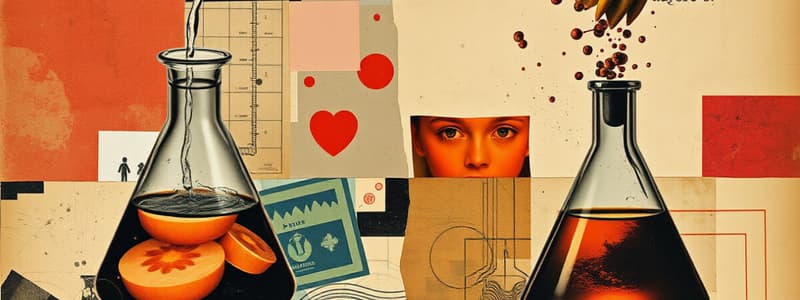Podcast
Questions and Answers
How do I know if my experiment is a chemical or physical change?
How do I know if my experiment is a chemical or physical change?
A chemical change always has a change of color, can possibly form bubbles, and may involve formation of a precipitate, gas, odor change, and temperature change. A physical change includes melting, size change, volume change, color change, density change, and crystal form.
What causes the substance change in chemical reactions?
What causes the substance change in chemical reactions?
A process that causes a substance to change into a new substance with a new chemical formula, involving breaking or making of interatomic bonds.
What causes the substance change in physical change?
What causes the substance change in physical change?
Cutting, bending, dissolving, freezing, boiling, and melting.
Water being heated? What kind of change is that?
Water being heated? What kind of change is that?
Explain the physical change that causes clouds to form.
Explain the physical change that causes clouds to form.
What evidence of a chemical reaction is observed when dropping an Alka-Seltzer tablet in water?
What evidence of a chemical reaction is observed when dropping an Alka-Seltzer tablet in water?
What evidence indicates that new substances with different properties are formed in a chemical reaction?
What evidence indicates that new substances with different properties are formed in a chemical reaction?
What is an example of a chemical change?
What is an example of a chemical change?
What happens when a shower turns into steam?
What happens when a shower turns into steam?
What is an example in my everyday life of a physical change?
What is an example in my everyday life of a physical change?
Flashcards are hidden until you start studying
Study Notes
Chemical vs. Physical Change
- Chemical changes are indicated by color change, bubble formation, gas production, odor changes, and temperature variations.
- Physical changes include processes like melting, change in size or volume, changes in color and density, and altering crystal form.
Causes of Substance Changes
- Chemical reactions result in new substances with different chemical formulas due to breaking and making interatomic bonds.
- Physical changes do not alter the chemical composition of substances and include actions such as cutting, bending, dissolving, freezing, boiling, and melting.
Heating Water
- Heating water can produce a chemical change when reactants interact, leading to a temperature change that indicates a reaction.
Cloud Formation
- Clouds form through condensation, a physical change where water vapor turns into liquid.
Evidence of Chemical Reactions (Alka-Seltzer)
- Dropping an Alka-Seltzer tablet in water produces bubbles, a sign of a chemical reaction that releases carbon dioxide gas.
Indicators of New Substance Formation
- Chemical reactions can be evidenced by temperature changes, gas production, precipitate formation, and color changes indicating new substances with different properties.
Lighting a Match
- Lighting a match is a chemical change resulting from reactants forming different products through a chemical reaction.
Boiling Water and Steam
- The transformation of boiling water into steam is a physical change, as it still consists of water molecules despite changes in state due to temperature.
Everyday Physical Change Example
- Melting an ice cube in a cup of water is a physical change, as energy is added but the substance remains water.
Studying That Suits You
Use AI to generate personalized quizzes and flashcards to suit your learning preferences.




